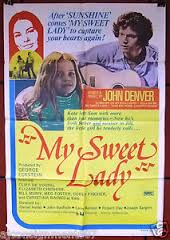
MY SWEET LADY (SUNSHINE Part II)
US, 1975, 94 minutes, Colour.
Cliff De Young, Elizabeth Cheshire, Meg Foster, Bill Mumy.
Directed by Joseph Sargent.
My Sweet Lady is a sequel to Sunshine. In fact it includes ten minutes of film footage from Sunshine to jog the memory and the emotions. We look at how Sam is managing to bring up a precociously five year old Jill. The film is full of the most wholesome traditional values of family love, marriage and a sense of responsibility, played for warm sentiment in humour and tears. It is almost a model of the expectations of American television viewing for the family. John Denver's songs are prominent. Cliff De Young manages to hold his own with Elizabeth Cheshire as the vocal Jill.
1. The appeal for this film? The television audience? Feminine audience? Made for the people who enjoyed Sunshine?
2. How evident were the television techniques? The aim at the television audience?
3. How well did the film integrate the footage from Sunshine? As flashbacks? Jogging audience memory and emotions? Understanding Sam and Jill with reference to Kate?
4. The importance of colour. locations, John Denver's music, the use of his songs? How did the music and songs make the atmosphere for the film? The title and its song?
5. The values that the film stood for? The traditional and wholesome values of family relationships,, marriage and love, responsibility?
6. How well did the film focus on Jill as its centre? A credible five year old girl, not having a mother, growing up looked after by her father, the scenes of her life at school and what she learnt, the experience of the dead rabbit? Her relationship to Sam, the father and daughter relationship? Its quality and its puzzles? Her worrying about death and the rabbit? Death for everyone and herself, e.g. afraid to go to sleep, her remarks to all the people about their dying? Her relationship to Nora, and her love for her? Suggesting to Sam that he remarry? The picnic scenes, the houseboat, Sam's singing to her over the phone? The final reconciliation at the end? What Jill was learning from her father and the experience?
7. How strong a character was Sam? His memories of Kate, his accepting the responsibility for her child and its upbringing in view of Kate's death? The importance of the flashbacks about their love and marriage? The quality of Sam's love for Jill? His overanxiety about bringing her up? Puzzling? Trying to be a father and mother? His ability to talk to Jill. show affection? His relationship with Nora? Why did Nora not want to marry him? Sam and his work. the audition. the rehearsals? His friendship for Weaver and Corey? Reliance on them for Jill? His illness? The happiness of their final walk along the beach?
8. How well developed was the character of Nora? Her way of life, her self-reliance, her love for Sam and J111 but not wanting to marry? Her being hurt by Sam's description of her life? Seeing her at work, Jill and the breaking of the plant?
9. The contribution of Weaver and Corey to the film? Friendship the zoo, their walking in and out of the house, the houseboat looking after Jill during Sam's illness? The audition? The comedy in their roles?
10. The focus on the problem of death, children and their training, their capacities for remembering and forgetting?
11. The resolution of the film the walk along the beach, Jill telling Sam what she had learnt from him?
12. The values and their exploration? The emphasis on humour and sentiment? How satisfying a humane film?